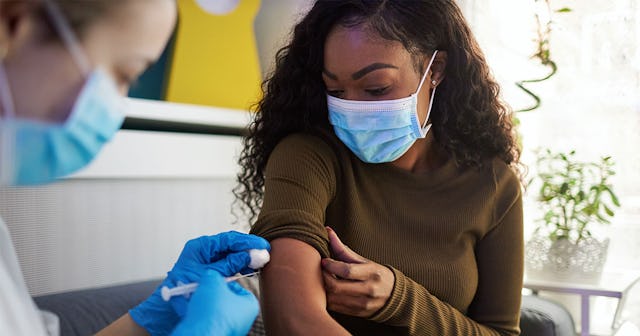It Looks Like COVID Vaccines Will Be Mandatory At Many Colleges

When college and university campuses reopened for in-person classes in the fall, COVID cases surged. The virus found footholds in dorms and infected thousands of students and employees, often also spreading into the community. Since the start of the pandemic, more than 530,000 COVID cases have been linked to colleges and universities.
A year ago, colleges relied on masks, social distancing, and hand hygiene to stop the spread of COVID. Now, they have a more formidable tool to prevent infection: vaccines. The vaccines work. But they only work if they are used—shots in arms. As a result, many colleges are requiring students to be vaccinated before returning to campus in the fall.
Rutgers University in New Jersey was the first of the colleges to require students to have a COVID vaccine. In explaining their mandate, Antonio Calcado, who leads Rutgers’ COVID-19 task force, said, “We felt that just simply encouraging would not have the same effect as a requirement.” Since Rutgers’ decision, many others have followed suit, including Duke University, Northeastern University, Syracuse, and the University of Notre Dame.
Requiring Vaccinations Is Not New
Mandatory vaccination isn’t new—immunizations are often required at colleges. A survey of about 100 colleges in the U.S. found that almost all of them required at least one vaccine for enrollment. Almost all of the schools surveyed required the MMR vaccine. Indeed, two decades ago, I wasn’t allowed to start at college without a meningitis vaccine.
Likewise, every state has at least some sort of vaccine mandate for public school children. Many of those mandates also include children attending private schools and daycares.
The Question of Emergency Use Authorization
Critics of the colleges’ requirements point to the fact that the vaccines are not FDA approved. Unlike other mandatory vaccines, the COVID-19 vaccines are being used under a FDA Emergency Use Authorization (EUA). It’s a fair point, and legal scholars confirm that it puts the question of making the vaccines mandatory into a “legal gray area.” However, the EUA status is unlikely to sway courts, who have consistently upheld vaccine mandates.
Harvard Law professor Glenn Cohen noted that there’s no legal reason that prevents colleges from requiring COVID-19 vaccines—full FDA approval or not. To support his case, he noted that colleges already require COVID testing, and those tests are approved under the same EUA. The American Council on Education also weighed in and determined that “the legal right of institutions to require COVID-19 vaccination for students seems likely to be upheld as vaccine availability increases.”
Also, and arguably more important, full approval for the vaccines is coming. FDA approval could even come as early as this summer, making the critic’s argument moot, anyway.
Medical And Religious Exemptions
Even in schools like Rutgers that have made vaccination mandatory, religious and medical exemptions exist. The medical exemption is required by federal law, and most schools are offering a religious exemption.
“Forty-five of the 50 states maintain religious exemptions. California and New York have dropped them in the past five or so years, and so you no longer have religious exemptions to being vaccinated in those states,” notes Eric Feldman, professor of law and professor of medical ethics and health policy at the University of Pennsylvania Carey Law School.
Previous court rulings upheld colleges’ choice to not give a religious exemption. However, that could change. The current, more conservative U.S. Supreme Court could change course going forward, explains Dorit Reiss, a law professor at the UC Hastings College of the Law in San Francisco, in an interview with NPR.
Logistical Issues
Thinking about vaccinating students comes with a set of logistical issues. The biggest question comes with respect to international students—those who cannot get a vaccine in their home country and those who’ve been vaccinated with a vaccine that’s not approved in the U.S. (like AstraZeneca).
Access to the vaccine for international students likely won’t be a problem. “Lots of schools already have developed pretty robust and regular testing protocols and those can be fairly quickly rolled into vaccine protocols,” notes Feldman.
The problem is in the weeks between injection and protection. International students who come to the U.S. and subsequently get vaccinated to attend class won’t be fully vaccinated for a number of weeks after injection. Colleges need to figure out what their obligation is to those students during the interim period between vaccination and full protection. Feldman notes that neither Rutgers nor any other school likely has it figured out yet, “[b]ut I think they know they need to figure it out.”
Colleges also need to consider the issue of vaccine hesitancy among in BIPOC communities, which may have a distrust of the medical community after decades of mistreatment, and the racial disparities in vaccine distribution and access. Bethany Robertson, co-founder and co-director of ParentsTogether, warns that “Colleges do need to get ahead of this and think about how this is going to play out.”
An Alternative To Mandates
Rather than mandate vaccines, some colleges are trying to incentivize vaccines. For example, the University of California San Diego plans to exempt students and faculty who are fully vaccinated from weekly asymptomatic testing. Dickinson State University in North Dakota will exempt fully vaccinated students from a mask mandate.
Ultimately the goal is simply this: safe classrooms, safe communities, safe ways to return to campus life for everyone. Vaccines are the way to make that happen.